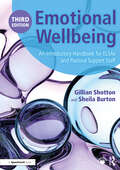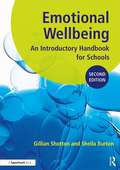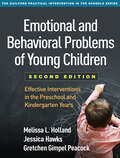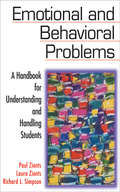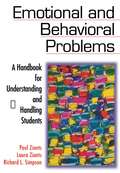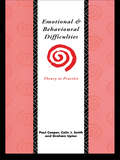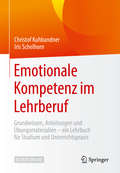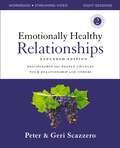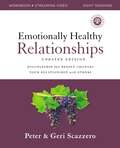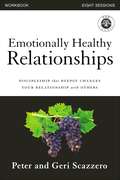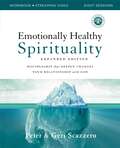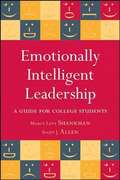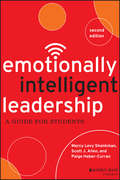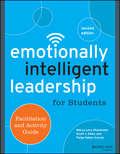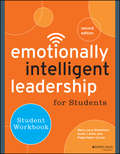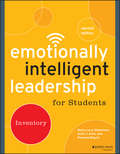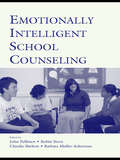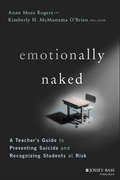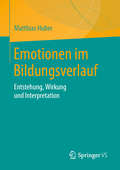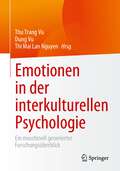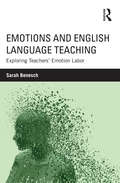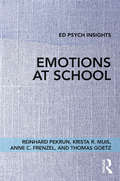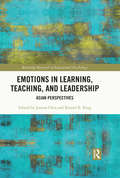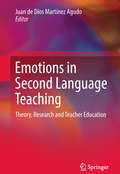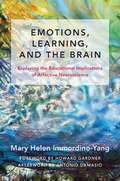- Table View
- List View
Emotional Wellbeing: An Introductory Handbook for ELSAs and Pastoral Support Staff
by Gillian Shotton Sheila BurtonThis is an essential resource for educators working to support emotional wellbeing in children and young people. Written by the team behind the Emotional Literacy Support Assistant (ELSA) training programme, it provides practical suggestions that can be implemented straight away to make a positive difference in the life of the young person.Fully updated, the third edition of this bestselling guide includes a new chapter on trauma and adverse childhood experiences, as well as expanded material to support neurodivergent children, help those who struggle with worry, and work more closely with parents and carers. The chapters give a clear overview of each topic underpinned by the latest research in educational psychology, descriptions of vulnerabilities as well as case studies, 'let's get practical' ideas, and reflective moments. Topics include: Self-esteem Friendship skills Social skills Therapeutic stories Understanding anger and anxiety Dealing with loss and bereavement. With fresh colour illustrations throughout, this resource will be vital reading for ELSA trainees as well as anyone wanting to provide the best possible support for the emotional wellbeing of the young people they work with. It is designed for use with individuals, groups or whole classes.
Emotional Wellbeing: An Introductory Handbook for Schools
by Gillian Shotton Sheila BurtonThis is an essential resource for educators working to support emotional wellbeing in children and young people. Written by the team behind the Emotional Literacy Support Assistant (ELSA) training programme, it provides practical suggestions that can be implemented straight away to make a positive difference in the life of the young person. The second edition of this bestselling guide has been fully updated and includes a new chapter on resilience as well as additional material on recognising and dealing with anxiety and anger. The chapters give a clear overview of each topic underpinned by the latest research in educational psychology, descriptions of vulnerabilities as well as case studies and suggestions for practical activities. Topics include: self-esteem; friendship skills; social skills; therapeutic stories; dealing with loss and bereavement. Designed for use with individuals, groups or whole classes, this will be vital reading for ELSA trainees as well as anyone wanting to provide the best possible support for the emotional wellbeing of the young people they work with.
Emotional and Behavioral Problems of Young Children, Second Edition: Effective Interventions in the Preschool and Kindergarten Years
by Gretchen Gimpel Peacock Jessica Malmberg Melissa L. HollandPresenting interventions that are practical, effective, and easy to implement in educational and clinical settings, this book addresses the most frequently encountered emotional and behavioral problems in 3- to 6-year-olds. Strategies for collaborating with parents are emphasized. Practitioners are taken step by step through assessing and treating conduct problems, anxiety and other internalizing problems, toileting difficulties, picky eating and related concerns, and sleep problems. User-friendly features include 36 reproducible parent handouts, assessment forms, and other clinical tools; the print book has a large-size format with lay-flat binding for easy photocopying. Purchasers get access to a Web page where they can download and print the reproducible materials. This book is in The Guilford Practical Intervention in the Schools Series. New to This Edition *Reflects over a decade of research advances, plus new assessments and interventions. *Updated for DSM-5. *Chapter on intervention within a multi-tiered system of support (MTSS). *Chapter on referral procedures for complex problems. *Mindfulness techniques for both parents and children. *Cutting-edge ways to use acceptance and commitment therapy principles and motivational interviewing with parents. *23 new or revised reproducible tools.
Emotional and Behavioral Problems: A Handbook for Understanding and Handling Students
by Richard L. Simpson Paul Zionts Laura T. ZiontsThe authors take a complex, under-discussed topic and give teachers and administrators useful, basic guidelines they can put to use quickly in understanding, identifying, and helping this special group of students.
Emotional and Behavioral Problems: A Handbook for Understanding and Handling Students
by Richard L. Simpson Paul Zionts Laura ZiontsA guide to teaching students with emotional and behavioral problems.
Emotional and Behavioural Difficulties: Theory to Practice
by Paul Cooper Graham Upton Colin J. SmithTeachers in mainstream schools are increasingly confronted with children with severe emotional and behavioural difficulties, for whose performance and effect on the rest of the class they are held accountable. Often exclusion seems to be the only option. This book shows that it is not. It provides a concise, clearly written guide to the major approaches which can be used to deal with emotional and behavioural difficulties - their possibilities and their pitfalls. It will be invaluable reading for special needs coordinators, individual teachers reflecting on the issue in their own classrooms and heads wishing to establish whole school approaches to the problem.
Emotionale Kompetenz im Lehrberuf: Grundwissen, Anleitungen & Übungsmaterialien – ein Lehrbuch für Studium und Unterrichtspraxis
by Christof Kuhbandner Iris SchelhornEine hohe emotionale Kompetenz ist für den Lehrberuf von enormer Wichtigkeit. Lehrkräfte, die ihre Emotionen gut kennen und regulieren und damit emotional flexibel reagieren können, schaffen nachweislich ein besseres Klassenklima, können mit schwierigen Situationen besser umgehen und sind psychisch und körperlich gesünder und widerstandsfähiger. Dieses Buch hilft Lehrerinnen und Lehrern, sich ihrer Emotionen bewusst(er) zu werden und eine hohe emotionale Kompetenz zu entwickeln. Dazu vermittelt es auf anschauliche Weise fundiertes Wissen darüber, was Emotionen sind, wie sie uns beeinflussen und auf welcher Grundlage sie entstehen. Weiterhin liefert das Buch praktische Anleitungen und Materialien für Übungen, Reflexionen, Diskussionsrunden und Rollenspiele, sowohl zum Selbststudium als auch für den Einsatz in der Ausbildung und Fortbildung von Lehrkräften und Trainings.
Emotionally Healthy Relationships Expanded Edition Workbook plus Streaming Video: Discipleship that Deeply Changes Your Relationship with Others
by Peter Scazzero Geri ScazzeroDiscipleship that Deeply Changes Your Relationship with Others As Part 2 of the Emotionally Healthy Discipleship Course, Pete and Geri Scazzero developed Emotionally Healthy (EH) Relationships over a 27-year period to directly address core biblical principles to guide you and others into an experience of discipleship that will deeply change your life.In EH Relationships Expanded Edition, everyone will learn eight practical relationship skills to develop mature, loving relationships with others, such as:Stop Mind Reading and Clarify ExpectationsClimb the Ladder of IntegrityIncarnational ListeningClean FightingAnd since loving others and loving God cannot be separated, each person will also grow in their personal, first-hand relationship with Jesus by incorporating stillness, silence, and Scripture as daily life rhythms. Part 2 of the Emotionally Healthy Discipleship Course also includes the newly-filmed Emotionally Healthy Relationships video and the Emotionally Healthy Relationships Day by Day devotional (sold separately).Join us for a powerful journey that will walk you through a door that will change forever the way you love God, others, and yourself.This workbook includes:Individual access to eight streaming video sessionsBetween-sessions personal studySession introductions, group discussion questions, and personal action stepsLeader&’s Guide and valuable appendicesSessions and video run times:Take Your Community Temperature Reading (31:00)Stop Mind Reading and Clarify Expectations (29:00)Genogram Your Family (29:30)Explore the Iceberg (23:00)Incarnational Listening (24:00)Climb the Ladder of Integrity (22:00)Clean Fighting (18:00)Develop a &“Rule of Life&” to Implement Emotionally Healthy Skills (8:00)This study guide has everything you need for a full Bible study experience, including:The study guide itself—with discussion and reflection questions, video notes, and a leader's guide.An individual access code to stream all video sessions online. (You don&’t need to buy a DVD!)Streaming video access code included. Access code subject to expiration after 12/31/2028. Code may be redeemed only by the recipient of this package. Code may not be transferred or sold separately from this package. Internet connection required. Void where prohibited, taxed, or restricted by law. Additional offer details inside.
Emotionally Healthy Relationships Updated Edition Workbook plus Streaming Video: Discipleship that Deeply Changes Your Relationship with Others
by Peter Scazzero Geri ScazzeroPete and Geri Scazzero developed the Emotionally Healthy (EH) Relationships Course over a 21-year period to directly address core biblical principles to guide you and others into an experience of discipleship that will deeply change your life. In the EH Relationships Course, everyone will learn 8 practical relationship skills to develop mature, loving relationships with others such as: Stop Mind Reading and Clarify Expectations Incarnational Listening Climb the Ladder of Integrity Clean Fighting And since loving others and loving God cannot be separated, each person will also grow in their personal, first-hand relationship with Jesus by incorporating stillness, silence, and Scripture as daily life rhythms. This is Part 2 of the Emotionally Healthy Discipleship Course that also includes the Emotionally Healthy Relationships video and the Emotionally Healthy Relationships Day by Day devotional. This workbook includes:Individual access to eight streaming video sessionsSession introductions, group discussion questions, and personal action stepsBetween-sessions personal studyLeader&’s Guide and valuable appendicesJoin us for a powerful journey that will walk you through a door that will change forever the way you love God, others, and yourself.SESSIONS INCLUDE: Take Your Community Temperature ReadingStop Mind Reading and Clarify ExpectationsGenogram Your FamilyExplore the IcebergListen IncarnationallyClimb the Ladder of IntegrityFight CleanlyDevelop a "Rule of Life" to Implement Emotionally Healthy SkillsDesigned for use with Emotionally Healthy Relationships Video Study, Updated Edition (sold separately).*Access code subject to expiration after 12/31/2026. Code may be redeemed only by the recipient of this package. Code may not be transferred or sold separately from this package. Internet connection required. Eligible only on retail purchases inside the United States. Void where prohibited, taxed, or restricted by law. Additional offer details inside.
Emotionally Healthy Relationships Workbook: Discipleship that Deeply Changes Your Relationship with Others
by Peter Scazzero Geri ScazzeroPete and Geri Scazzero developed The Emotionally Healthy (EH) Relationships Course over a 21-year period to directly address core biblical principles to guide you and others into an experience of discipleship that will deply change your life. In the EH Relationships Course, everyone will learn 8 practical relationship skills to develop mature, loving relationships with others such as:Stop Mind Reading and Clarify ExpectationsIncarnational ListeningClimb the Ladder of IntegrityClean FightingAnd since loving other sand loving God cannot be separated, each person will also grow in their personal, first-hand relationships with Jesus by incorporating stillness, silence, and Scripture as daily life rhythms.This workbook includes sessions introductions, group discussion questions, personal action steps, and between the sessions personal study. It is part of the Emotionally Healthy (EH) Relationships Course that also includes the Emotionally Healthy Relationships video and the Emotionally Healthy Relationships Day by Day devotional.Join us for a powerful journey that will walk you through a door that will change forever the way you love God, others, and yourself.Sessions include:Take Your Community Temperature ReadingStop Mind Reading and Clarify ExpectationsGenogram Your FamilyExplore the IcebergListen IncarnationallyClimb the Ladder of IntegrityFight CleanlyDevelop a “Rule of Life” to Implement Emotionally Healthy SkillsDesigned for use with the Emotionally Healthy Relationships Video Study (sold separately).
Emotionally Healthy Spirituality Expanded Edition Workbook plus Streaming Video: Discipleship that Deeply Changes Your Relationship with God (Emotionally Healthy Spirituality)
by Peter Scazzero Geri ScazzeroPeter Scazzero learned the hard way: you can't be spiritually mature while remaining emotionally immature.In the Emotionally Healthy Spirituality Workbook Expanded Edition (DVD/digital downloads sold separately), Peter outlines a roadmap for discipleship with Jesus that is powerfully transformative. He unveils what's wrong with our current definition of "spiritual growth" and offers not only a model of spirituality that actually works, but seven steps to change that will help you experience authentic faith and hunger for God. Though Peter was an experienced pastor of a growing church, his life and faith remained emotionally unhealthy. Like so many in the church, he routinely:avoided healthy conflict in the name of keeping the peaceignored and suppressed emotionsused work for God as an excuse to run from Godlived without limitsIn this updated and expanded workbook, Peter helps you unpack core biblical principles to guide you into an experience of lasting, beneath-the-surface transformation in your relationship with Christ. The workbook includes session introductions, group discussion questions, application, and between-sessions personal study.This workbook is Part One of the Emotionally Healthy Discipleship Course that also includes the bestselling books, Emotionally Healthy Spirituality and Emotionally Healthy Spirituality Day by Day. Join us for a powerful journey that will walk you through a door that will change forever the way you love God, others, and yourself.Designed for use with the Emotionally Healthy Spirituality Video Expanded Edition (sold separately).
Emotionally Intelligent Leadership
by Scott J. Allen Marcy Levy ShankmanEmotionally Intelligent Leadership is a groundbreaking book that combines the concepts of emotional intelligence and leadership in one model--emotionally intelligent leadership (EIL). This important resource offers students a practical guide for developing their EIL capacities and emphasizes that leadership is a learnable skill that is based on developing healthy and effective relationships. Step by step, the authors outline the EIL model (consciousness of context, consciousness of self, and consciousness of others) and explore the twenty-one capacities that define the emotionally intelligent leader.
Emotionally Intelligent Leadership
by Scott J. Allen Marcy Levy Shankman Paige Haber-CurranThe only book for students which explores the connection between emotional intelligence and effective leadershipEmotionally Intelligent Leadership: A Guide for Students is based on a conceptual model that helps students to become emotionally intelligent leaders. Research from around the world has demonstrated that there is a relationship between emotional intelligence and leadership. For the second edition of Emotionally Intelligent Leadership, the authors have incorporated their revised, data-based emotionally intelligent leadership (EIL) model into an engaging text for high school, undergraduate, and graduate students.The book can be used in conjunction with the Emotionally Intelligent Leadership for Students Inventory and Student Workbook for an immersive and transformative educational experience. Students will appreciate the opportunity to learn more about themselves as they reflect on their experiences as learners and their own leadership journeys.The new edition is substantially rewritten based new research on the EIL modelIts clear structure is organized around the three facets of emotionally intelligent leadership and 19 leadership capacitiesQuestions at the end of each chapter encourage purposeful reflection and leadership growthEmotionally Intelligent Leadership is one of a kind, fostering growth and promoting intense self-reflection. Students are empowered to enhance the campus experience and develop into effective leaders of the future. Emotionally Intelligent Leadership is the perfect introduction to leading with emotional intelligence.
Emotionally Intelligent Leadership for Students
by Scott J. Allen Marcy Levy Shankman Paige Haber-CurranA how-to guide to help for facilitators and instructors develop emotionally intelligent leadership capacities in their studentsThe Emotionally Intelligent Leadership for Students: Facilitation and Activity Guide delivers a comprehensive curriculum for those who want to help students foster the 19 emotionally intelligent leadership (EIL) capacities presented in the book Emotionally Intelligent Leadership: A Guide for Students. Research from around the world has demonstrated that there is a relationship between emotional intelligence and leadership. For the all-new second edition, the authors have completely rewritten all the modules according to their revised, data-based EIL model. These activities bring theory into practice, targeting specific learning outcomes that will help students become better leaders.This guide will allow you to lead students through the Emotionally Intelligent Leadership for Students: Student Workbook and can be used with or without the Emotionally Intelligent Leadership for Students: Inventory, which helps students to assess their EIL capacities.Contains 23 all new modules consisting of step-by-step instructions for facilitating leadership activitiesReflects 19 emotionally intelligent leadership capacities derived from new researchProvides hands-on learning experiences and case studies that allow students to enhance their leadership abilitiesIncludes clear instructions for modifying activities to fit any setting or time constraintThe Emotionally Intelligent Leadership for Students suite of resources offers an immersive and transformative educational experience, fostering growth and promoting intense self-reflection. Students will be empowered to develop into the effective leaders of the future.
Emotionally Intelligent Leadership for Students
by Scott J. Allen Marcy Levy Shankman Paige Haber-CurranThe workbook that helps students connect emotional intelligence with leadership skillsThe Emotionally Intelligent Leadership for Students: Student Workbook contains hands-on activities and case studies to help students foster the 19 capacities of emotionally intelligent leadership (EIL) presented in the main text Emotionally Intelligent Leadership: A Guide for Students. Research from around the world has demonstrated that there is a relationship between emotional intelligence and leadership. For the substantially revised second edition, the authors have completely rewritten all modules and activities according to their data-based model. These activities bring theory into practice, targeting specific learning outcomes that will help students become better leaders.The workbook can be used in conjunction with the Emotionally Intelligent Leadership for Students: Inventory which helps students to assess their leadership behaviors. The companion Emotionally Intelligent Leadership for Students: Facilitation and Activity Guide is aligned with the workbook to serve as a road map for educators.Contains 23 all new modules consisting of activities and case studies that further the understanding and relevancy of the emotionally intelligent leadership modelReflects 19 emotionally intelligent leadership capacities derived from new research research that provides evidence of construct validityCan be used as a self-guided experience for developing capacities of EILIncludes tips for improving each leadership capacity, suggestions for further reading, and films to watchThe Emotionally Intelligent Leadership for Students suite of resources offers an immersive and transformative educational experience, fostering growth and promoting intense self-reflection. Students will be empowered to develop into the effective leaders of the future.
Emotionally Intelligent Leadership for Students
by Scott J. Allen Marcy Levy Shankman Rosanna MiguelThe only instrument that measures behaviors associated with emotionally intelligent leadershipThe Emotionally Intelligent Leadership for Students: Inventory is an evidence-based assessment of the capacities of emotionally intelligent leadership (EIL). Research that spans the globe has demonstrated that there is a relationship between emotional intelligence and leadership. For the second edition, the authors have conducted original studies, yielding a substantial revision that better reflects the world of emotionally intelligent leadership and will be transformative for students of all backgrounds.First, this 57-item assessment measures how often students engage in behaviors that align with emotionally intelligent leadership. Then, the reflection portion walks students through the process of analyzing and understanding their results, giving them concrete suggestions for how to explore and improve their emotionally intelligent leadership.The inventory reflects 19 EIL capacities supported by recent studiesA section on guided interpretation allows students to determine next steps to help them prepare to become effective leadersGuidance for reflection and analysis of the results introduces learning opportunities that align with unique learning stylesUse the inventory along with Emotionally Intelligent Leadership: A Guide for Students and its Student Workbook for an immersive and transformative educational experience. Students will appreciate the opportunity to learn more about themselves as they reflect on their experiences as learners and their own leadership journeys.
Emotionally Intelligent School Counseling
by Robin Stern Claudia Shelton John Pellitteri Barbara Muller-AckermanThe concept of emotional intelligence (EI), which has steadily gained acceptance in psychology, seems particularly well suited to the work of school counselors and school psychologists who must constantly deal with troubled and underperforming students. To date, however, no book has systematically explained the theoretical and scientific foundations of emotional intelligence and integrated this information into the roles and functions of school counselors and other school personnel. In addition to illustrating how social emotional learning is important to both individual students and to school climate, the book also shows school counselors how to expand their own emotional awareness and resiliency. Key features of this outstanding new book include:*ASCA Guidelines. The book integrates the latest findings from the field of social emotional learning with the new ASCA guidelines for school counselors.*Real-life Cases. The book moves quickly from an overview of basic definitions, theories, and guidelines to stories of real counselors, administrators, teachers, and parents.*Author Expertise. John Pellitteri is Professor and Director of the Graduate Program in School Counseling Queens College (CUNY). A former school counselor, he is a leading researcher in the area of emotional intelligence. Barbara Ackerman is a K-5 school counselor and retiring Vice President of the American School Counseling Association (ASCA) Elementary School Division. Claudia Shelton has been a school counselor in grades 6-12 and currently heads a firm specializing in professional development for schools. Robin Stern is an adjunct associate professor and researcher at Columbia Teachers College and a specialist in social emotional learning for the New York City Board of Education.This book is appropriate as a supplementary text in school counseling courses and as a professional reference work for practicing school counselors, counselor educators, counseling psychologists, school psychologists, and school administrators.
Emotionally Naked: A Teacher's Guide to Preventing Suicide and Recognizing Students at Risk
by Anne Moss Rogers Kimberly H. O'BrienDiscover effective strategies to help prevent youth suicide In Emotionally Naked: A Teacher’s Guide to Preventing Suicide and Recognizing Students at Risk, trainer, speaker, and suicide loss survivor Anne Moss Rogers, and clinical social worker and researcher, Kimberly O’Brien, PhD, LICSW, empower middle and high school educators with the knowledge and skills to leverage their relationships with students to reduce this threat to life. The purpose of this book is not to turn teachers into therapists but given the pervasive public health problem of suicide in our youth, it’s a critical conversation that all educators need to feel comfortable having. Educators will learn evidence-based concepts of suicide prevention, plus lesser known innovative strategies and small culture shifts for the classroom to facilitate connection and healthy coping strategies, the foundation of suicide prevention. Included is commentary from teachers, school psychologists, experts in youth suicidology, leaders from mental health nonprofits, program directors, and students. In addition, readers will find practical tips, and sample scripts, with innovative activities that can be incorporated into teaching curricula. You’ll learn about: The teacher’s role in suicide prevention, intervention, postvention, collaboration The different and often cryptic ways students indicate suicidality What to do/say when a student tells you they are thinking of suicide Small shifts that can create a suicide-prevention classroom/school environment How to address a class of grieving students and the empty desk syndrome Link to a download of resources, worksheets, activities, scripts, quizzes, and more Who is it for: Middle/high school teachers and educators, school counselors, nurses, psychologists, coaches, and administrators, as well as parents who wish to better understand the complex subject of youth suicide.
Emotionen im Bildungsverlauf: Entstehung, Wirkung und Interpretation
by Matthias HuberDas Buch widmet sich in systematischer Weise der Bedeutung von Emotionen für Bildungsverläufe und Bildungslaufbahnentscheidungen. Im Anschluss an einen fundierten theoretischen Überblick historischer und aktueller Perspektiven auf Bildung und Emotion wird auf der Grundlage einer multimethodischen und partizipativen Studie der zentrale Stellenwert von Emotionen im Bildungsverlauf veranschaulicht. Dabei wird erstmals deutlich, welche emotional konnotierten Vorstellungsbilder Schülerinnen und Schüler in ihrer Bildungslaufbahn maßgeblich leiten und was die zentralen Einflussfaktoren für die Entstehung jener Vorstellungsbilder sind. Überdies wird gezeigt, welche Emotionen und emotionalen Qualitäten im Bildungskontext aus subjektiver Perspektive die Bedeutendsten sind und welche Funktionen und Wirkungen Emotionen in der eigenen Bildungsbiografie zeitigen.
Emotionen in der interkulturellen Psychologie: Ein maschinell generierter Forschungsüberblick
by Thu Trang Vu Dung Vu Thi Mai Lan NguyenDieses Buch gibt in fünf Themenfelder gegliedert einen Überblick über die Emotionsforschung in der kulturübergreifenden Psychologie. Es werden kulturelle Ähnlichkeiten und Unterschiede in verschiedenen Aspekten von Emotionen erörtert – vom emotionalen Ausdruck über die emotionale Anerkennung bis hin zur Emotionsregulation. Die Emotionsforschung aus der Perspektive der interkulturellen Psychologie ermöglicht den Leser:innen eine differenziertere Sicht: Es geht nicht nur um den Unterschied zwischen Individualismus und Kollektivismus, sondern auch darum, wie der breite Kontext viele psychologische Prozesse dazwischen beeinflusst, die wiederum die emotionale Verarbeitung und Reaktion steuern. Das Buch enthält einen systematischen Literaturüberblick auf der Grundlage maschinell generierter Inhalte. Fragen und zugehörige Schlüsselwörter wurden für die Maschine vorbereitet, die sie abgefragt, entdeckt, zusammengestellt und durch Clustering mit künstlicher Intelligenz (KI) strukturiert hat. Springer Nature hat in den letzten Jahren viel zu dem Thema in Zeitschriften veröffentlicht, so dass die Herausforderung für die Maschine darin bestand, die relevantesten Inhalte zu identifizieren und sie in einer strukturierten Weise zu präsentieren. Die automatisch generierten Literaturzusammenfassungen dienen Fachkräften aus den Bereichen Psychologie, Erziehung und Wirtschaft, aber auch Wissenschaftler:innen und Studierenden dazu, sich schnell einen Überblick über die aktuelle Entwicklung des Themas zu verschaffen. Sie sollen außerdem als Anregung und Impuls für aktuelle Forschungsfragen, für neue Strategien sowie für mögliche Lösungen in schwierigen Situationen nützlich sein.
Emotions and English Language Teaching: Exploring Teachers’ Emotion Labor
by Sarah BeneschTaking a critical approach that considers the role of power, and resistance to power, in teachers’ affective lives, Sarah Benesch examines the relationship between English language teaching and emotions in postsecondary classrooms. The exploration takes into account implicit feeling rules that may drive institutional expectations of teacher performance and affect teachers’ responses to and decisions about pedagogical matters. Based on interviews with postsecondary English language teachers, the book analyzes ways in which they negotiate tension—theorized as emotion labor—between feeling rules and teachers’ professional training and/or experience, in particularly challenging areas of teaching: high-stakes literacy testing; responding to student writing; plagiarism; and attendance. Discussion of this rich interview data offers an expanded and nuanced understanding of English language teaching, one positing teachers’ emotion labor as a framework for theorizing emotions critically and as a tool of teacher agency and resistance.
Emotions at School (Ed Psych Insights)
by Thomas Goetz Reinhard Pekrun Krista R. Muis Anne C. FrenzelFor more than a decade, there has been growing interest in the role of emotions in academic settings. Written by leading experts on learning and instruction, Emotions at School focuses on the connections between educational research and emotion science, bringing the subject to a wider audience. With chapters on how emotions develop and work, evidence-based recommendations about how to foster adaptive emotions, and clear explanations of key concepts and ideas, this concise volume is designed for any education course that includes emotions in the curriculum. It will be indispensable for student researchers and both pre- and in-service teachers alike.
Emotions in Learning, Teaching, and Leadership: Asian Perspectives (Routledge Research in Educational Psychology)
by Ronnel B. King Junjun ChenEmotions are at the core of the educational enterprise but their role is mostly left unexamined. This book explores the role of emotions across students, teachers and school leaders. It showcases current theoretical and empirical research on emotions in educational settings conducted in the Asian context. The book consists of three parts, namely, emotions in learning, emotions in teaching and emotions in leadership. These chapters cover different levels from students (e.g., school, university), to teachers (e.g., pre-service, in-service) and to school leaders (e.g., middle-level teachers, principals). Samples are recruited from a wide range of Asian contexts (e.g., Hong Kong SAR, Macau SAR, Mainland China, Singapore and the Philippines). Collectively, the authors use a variety of methods ranging from quantitative to qualitative approaches and demonstrate innovative theoretical work that pushes the boundaries of emotions research forward.
Emotions in Second Language Teaching
by Juan de Martínez AgudoThis edited volume explores the multifaceted nature of teacher emotions, presenting current research from different approaches and perspectives, focused towards the second language classroom. Twenty three chapters by well-known scholars from the applied linguistics, TESOL and educational psychology fields provide the reader with a holistic picture of teacher emotions, making this collection a significant contribution to the field of second language teaching. Given the emotional nature of teaching, the book explores a number of key issues or dimensions of L2 teachers’ emotions that were until now rarely considered. The contributions present the views of a select group of applied linguistic researchers and L2 teacher educators from around the world. This international perspective makes the book essential reading for both L2 teachers and teacher educators.
Emotions, Learning, and the Brain: Exploring the Educational Implications of Affective Neuroscience (The Norton Series on the Social Neuroscience of Education)
by Antonio Damasio Howard Gardner Mary Helen Immordino-YangAn orientation to affective neuroscience as it relates to educators. In this ground-breaking collection, Mary Helen Immordino-Yang--an affective neuroscientist, human development psychologist, and former public school teacher--presents a decade of work with the potential to revolutionize educational theory and practice by deeply enriching our understanding of the complex connection between emotion and learning. With her signature talent for explaining and interpreting neuroscientific findings in practical, teacher-relevant terms, Immordino-Yang offers two simple but profound ideas: first, that emotions are such powerful motivators of learning because they activate brain mechanisms that originally evolved to manage our basic survival; and second, that meaningful thinking and learning are inherently emotional, because we only think deeply about things we care about. Together, these insights suggest that in order to motivate students for academic learning, produce deep understanding, and ensure the transfer of educational experiences into real-world skills and careers, educators must find ways to leverage the emotional aspects of learning. Immordino-Yang has both the gift for captivating readers with her research and the ability to connect this research to everyday learning and teaching. She examines true stories of learning success with relentless curiosity and an illuminating mixture of the scientific and the human. What are feelings, and how does the brain support them? What role do feelings play in the brain's learning process? This book unpacks these crucial questions and many more, including the neurobiological, developmental, and evolutionary origins of creativity, facts and myths about mirror neurons, and how the perspective of social and affective neuroscience can inform the design of learning technologies.
